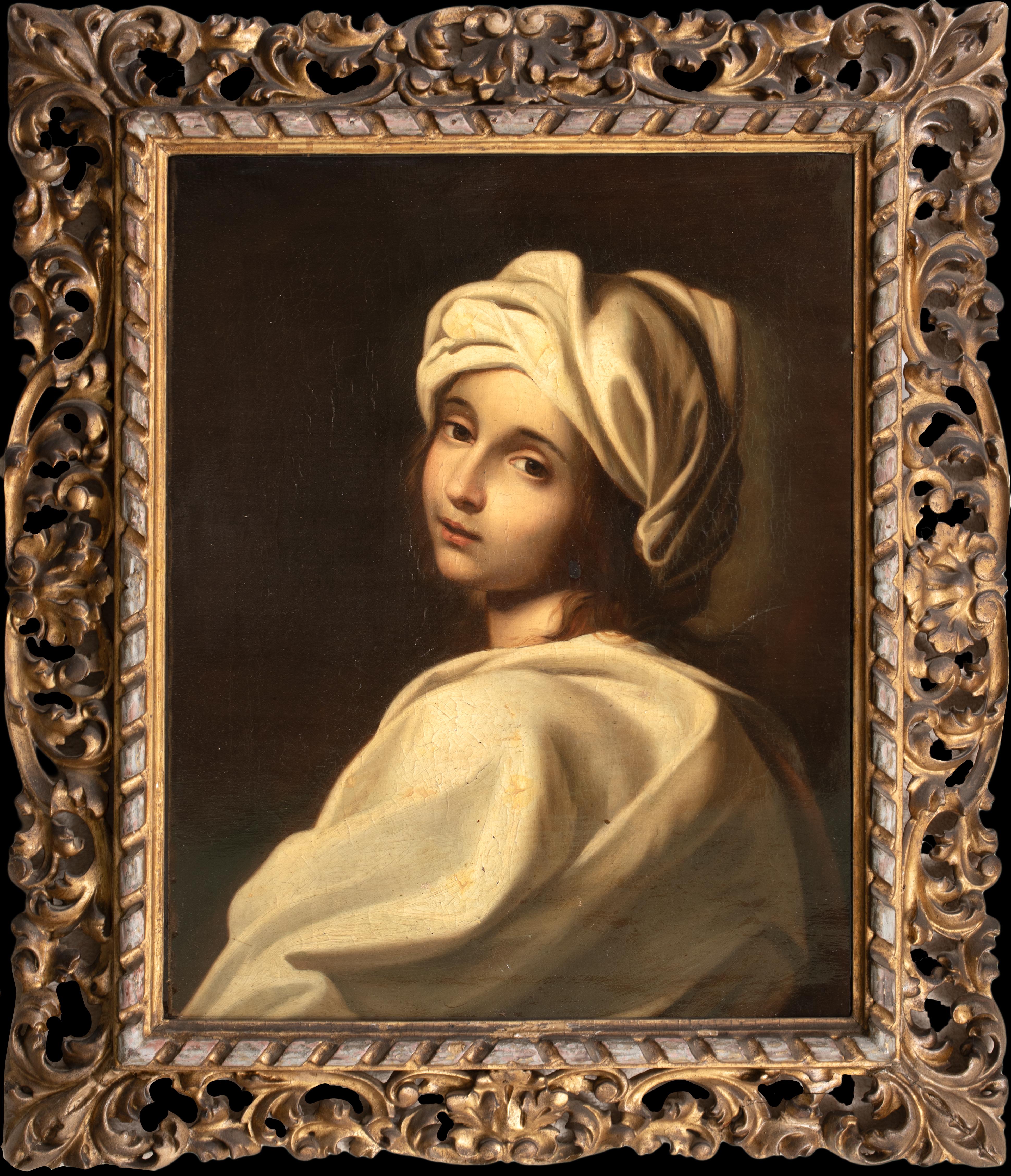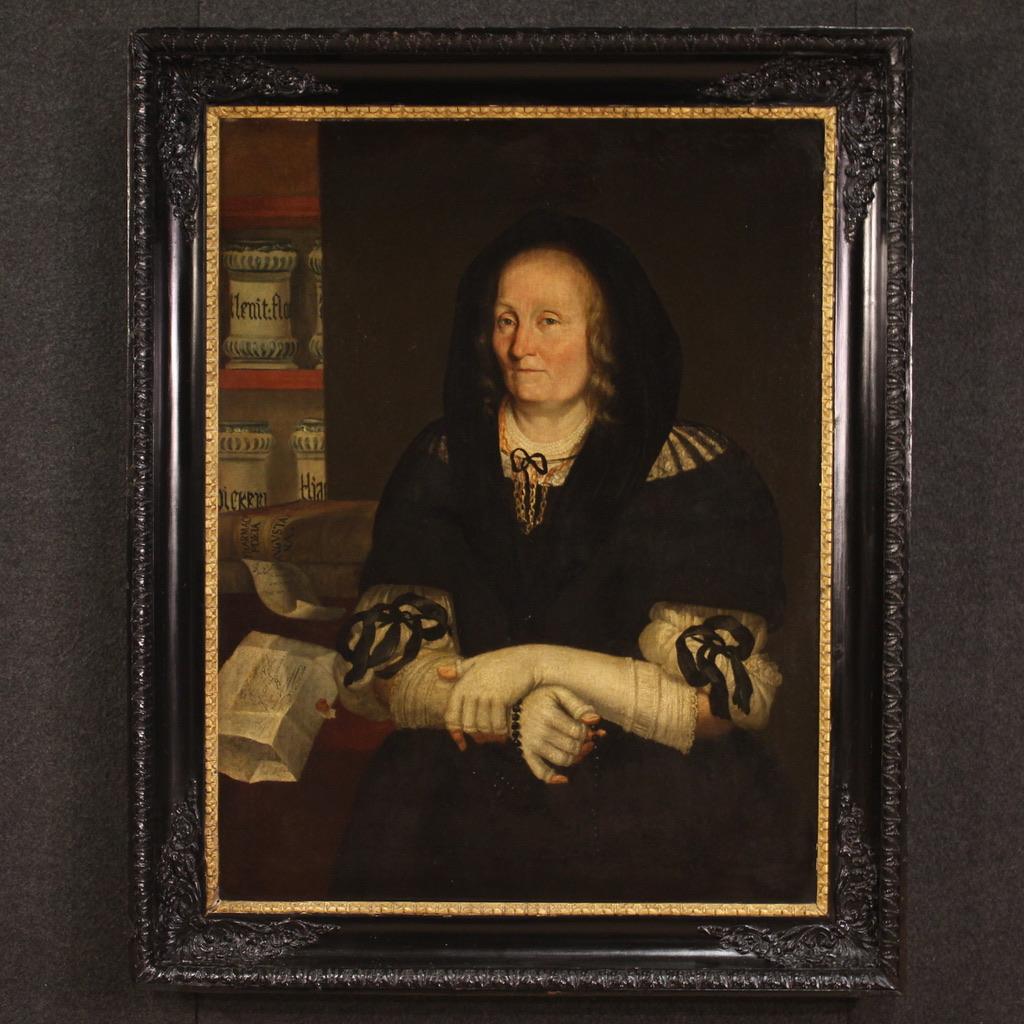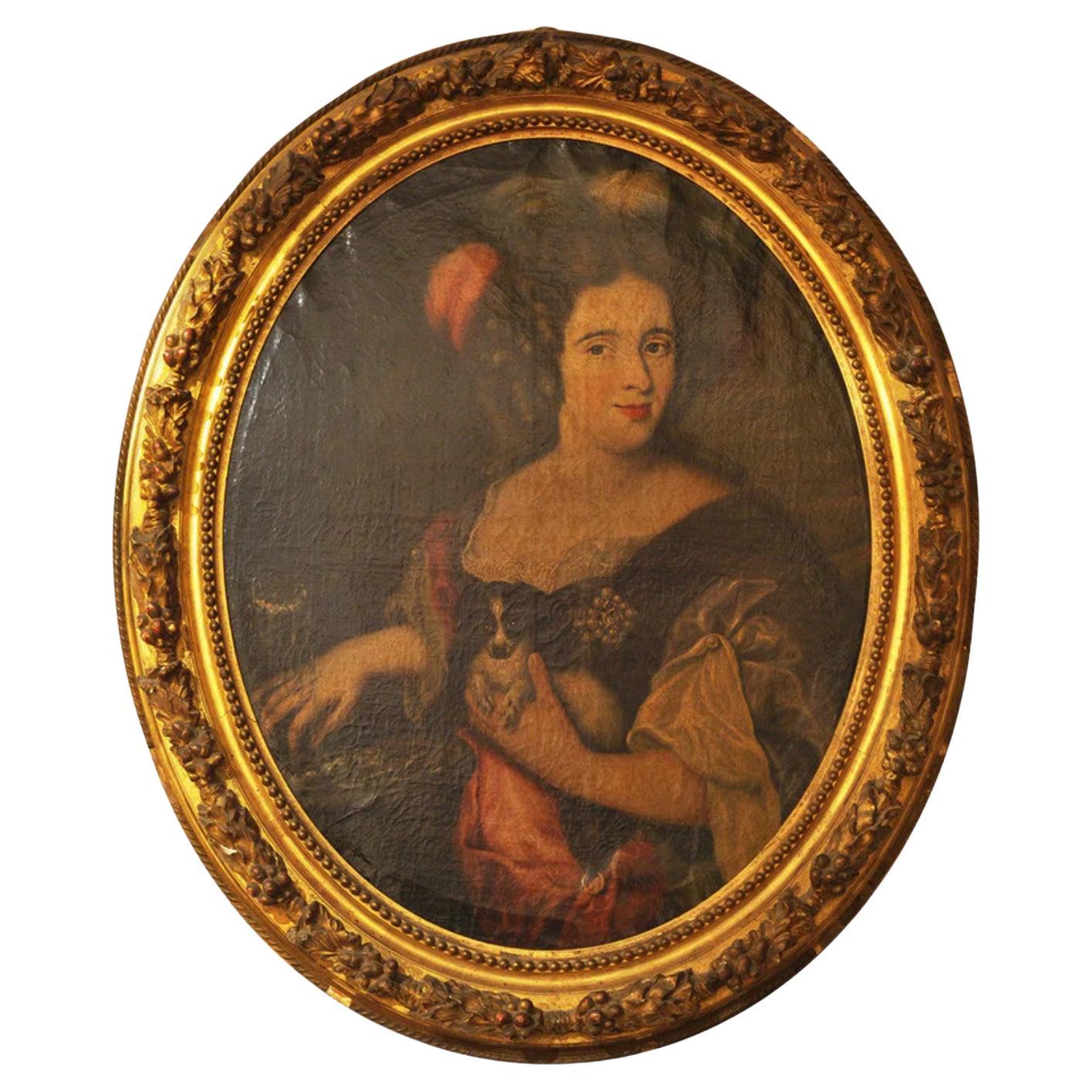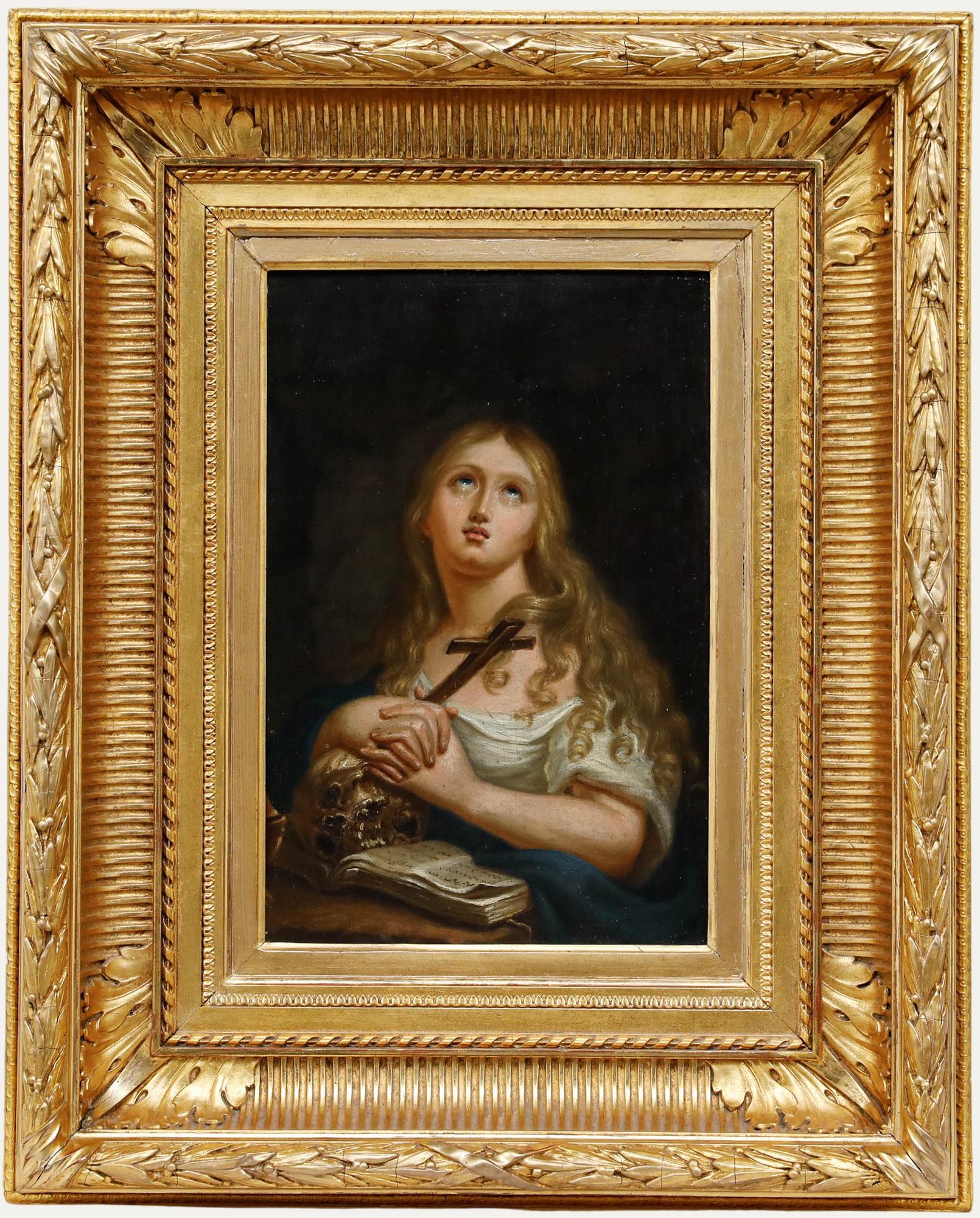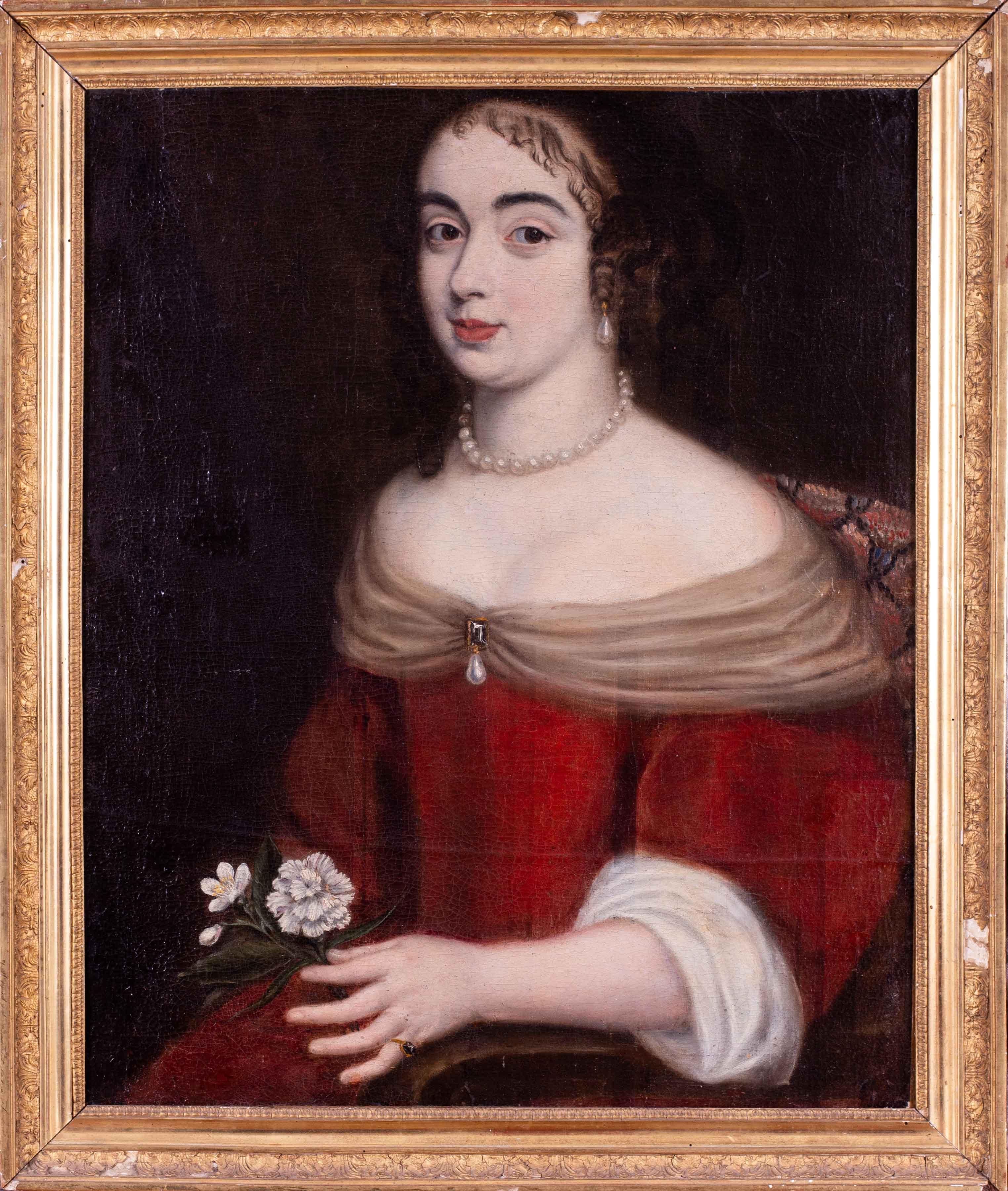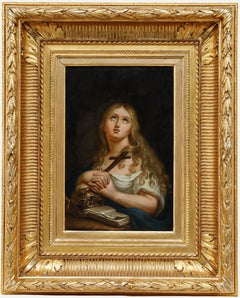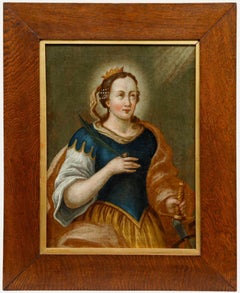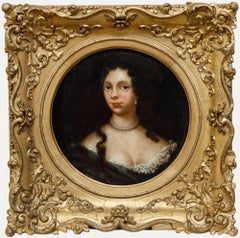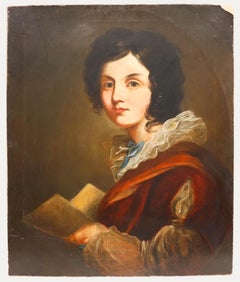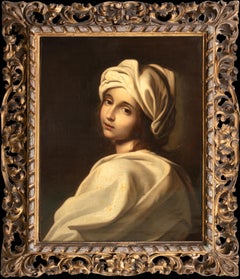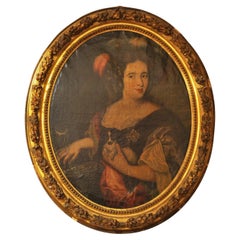Items Similar to Italian School 18th Century Oil - Sibylla Phrygia
Want more images or videos?
Request additional images or videos from the seller
1 of 7
UnknownItalian School 18th Century Oil - Sibylla PhrygiaEarly 18th Century
Early 18th Century
$1,486
£1,148.19
€1,327.42
CA$2,099.83
A$2,355.09
CHF 1,233.33
MX$28,616.69
NOK 15,661.18
SEK 14,847.90
DKK 9,908.49
About the Item
An angelic 18th-century portrait of the Phrygian Sibyl, one of the many prophetesses in ancient Greek mythology. Sibyls, including the Phrygian Sibyl, have been depicted in various forms of art, often as elegant women holding scrolls or holy symbols, gazing upwards towards a prophetic vision. This particular portrait has been inscribed in Latin at the top with the number 9 signifying its position in a possible series of the 10 Sibyls. Well presented in a complementing black and gilt moulded frame with an internal linen slip. Unsigned. On canvas.
- Creation Year:Early 18th Century
- Dimensions:Height: 34.85 in (88.5 cm)Width: 28.15 in (71.5 cm)
- Medium:
- Period:
- Condition:The painting has historic restoration with a relined, stiff, and undulated canvas. Filling and retouching appear at the edges, including careful overpainting of the ‘LA’ in Sibylla. The modern frame has widespread craquelure and light marks.
- Gallery Location:Corsham, GB
- Reference Number:Seller: sp3131stDibs: LU881316290032
About the Seller
4.9
Gold Seller
Premium sellers maintaining a 4.3+ rating and 24-hour response times
Established in 2010
1stDibs seller since 2018
1,296 sales on 1stDibs
Typical response time: 5 hours
- ShippingRetrieving quote...Shipping from: Corsham, United Kingdom
- Return Policy
Authenticity Guarantee
In the unlikely event there’s an issue with an item’s authenticity, contact us within 1 year for a full refund. DetailsMoney-Back Guarantee
If your item is not as described, is damaged in transit, or does not arrive, contact us within 7 days for a full refund. Details24-Hour Cancellation
You have a 24-hour grace period in which to reconsider your purchase, with no questions asked.Vetted Professional Sellers
Our world-class sellers must adhere to strict standards for service and quality, maintaining the integrity of our listings.Price-Match Guarantee
If you find that a seller listed the same item for a lower price elsewhere, we’ll match it.Trusted Global Delivery
Our best-in-class carrier network provides specialized shipping options worldwide, including custom delivery.More From This Seller
View AllFine 18th Century Oil - Mary Magdalene
Located in Corsham, GB
A striking 18th century oil depicting a pious Mary Magdalene. The artist portrays the saint with long, flowing blonde hair and penitent tears in her eyes. A skull at her hands remind...
Category
Early 18th Century Figurative Paintings
Materials
Oil
Early 19th Century Oil - Saint Barbara of Nicomedia
Located in Corsham, GB
A charming depiction of Saint Barbara, a Christian martyr and a symbol of courage and devotion in the face of adversity. She is also the patron saint of armourers, artillerymen, mili...
Category
Early 19th Century Portrait Paintings
Materials
Oil
Fine 18th Century Oil - Portrait of a Lady in Pearls
Located in Corsham, GB
A delightfully elegant 18th-century tondo depicting a lady in pearls. The subject is rendered in exquisite detail and is captured in fine attire, typical of the Georgian period. Beau...
Category
Early 18th Century Portrait Paintings
Materials
Oil
19th Century Oil - The Reader
Located in Corsham, GB
This charming portrait showcases a figure in rich, warm tones against a dark background, creating a striking contrast. The subject is depicted wearing elegant clothing with a ruffled...
Category
19th Century Portrait Paintings
Materials
Oil
German School 19th Century Oil - Study of a Saint
Located in Corsham, GB
This early devotional painting depicts a serene female figure, possibly the Virgin Mary, with eyes closed and head gently inclined. The composition is rendered in soft, muted tones a...
Category
19th Century Figurative Paintings
Materials
Oil
Early 20th Century Oil - Ann Heron
Located in Corsham, GB
A fine early 20th Century copy of the original portrait (by an unknown artist) of Ann Heron (nee Vining). The sitter is a solemn young woman in a white dress and red cloak. The paint...
Category
Early 20th Century Portrait Paintings
Materials
Oil
$572 Sale Price
20% Off
You May Also Like
Sybil, 18th Century Italian School
By Guido Reni
Located in Blackwater, GB
Sybil, 18th Century
Italian School - After Guido Reni
Large 18th Century Italian Old Master depiction of a Sybil (Apollonian Oracle / Prophetess), oil on canvas. Beautiful quality ...
Category
17th Century Portrait Paintings
Materials
Canvas, Oil
$4,813 Sale Price
35% Off
Portrait Woman Princess Diziani Paint 18th Century Oil on canvas Old master Art
Located in Riva del Garda, IT
Gaspare Diziani (Belluno 1689 - Venice 1767)
Portrait of a Young Princess (Salome?)
Oil on canvas
42 x 33 cm
Framed 70 x 63 cm
A charming portrait of a beautiful young woman with ...
Category
18th Century Old Masters Paintings
Materials
Oil
$6,664 Sale Price
20% Off
17th Century Italian Oil on Canvas Portrait Painting, 1680
Located in Vicoforte, IT
Antique Italian painting from the second half of the 17th century. Oil on canvas artwork depicting a portrait of an old lady, The widow of the pharmacist from Trento, of good pictori...
Category
1680s Portrait Paintings
Materials
Canvas, Oil
An 18th Century European School Painting
Located in ARMADALE, VIC
An Portrait of a Lady and her Dog, 18th Century, European School
The oval painting within its original oak leaf and beaded gilt-wood frame, oil on canvas.
Height: 101 cm Width: 85 ...
Category
Antique 18th Century English Baroque Paintings
Materials
Canvas
French School, 17th Century, 'Portrait of the Marquise de Grugieres', oil canvas
Located in Petworth, West Sussex
French school, 17th Century
Portrait of the Marquise de Grugieres
Oil on canvas
26.1/4 x 21.5/8 in. (66.7 x 54.8 cm.)
In a gilded composite frame, later production (possible early 1...
Category
17th Century Old Masters Portrait Paintings
Materials
Canvas, Oil
18th Century Italian School "Sybile" Signed
Located in Madrid, ES
18th Century Italian School
"Sybile"
H.s.t. bears a signature,
oil on canvas
37cm x 30cm
good condition
Category
Antique 18th Century Italian Baroque Paintings
Materials
Paint
More Ways To Browse
18th Century Italian Paintings
Oil Italian Paintings 18th Century
Ancient Scrolls
Bust Queen Elizabeth I
Carlo Mancini
Charles Andre Van Loo
Daniel Brennan
Elizabethan Oil Portrait
Flora Goddess Oil Painting
Frank Dicksee
Jay Z Portrait
Jeanne Reed
John Voss
Lionel Ellis
Robert Rector
Russell Young Elvis
Terry Shelbourne
Walter Stuempfig
